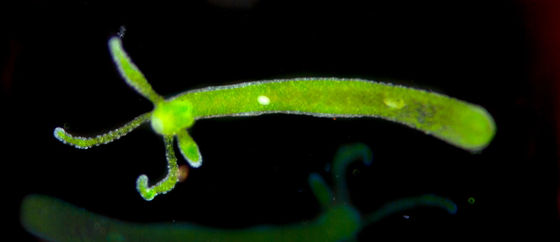Sleep evolved long before the brain was able to

A sleep-like state in Hydra unravels conserved sleep mechanisms during the evolutionary development of the central nervous system | Science Advances
https://advances.sciencemag.org/content/6/41/eabb9415
Where is the origin of our sleep? | Research Results | Kyushu University (KYUSHU UNIVERSITY)
https://www.kyushu-u.ac.jp/ja/researches/view/504
Sleep Evolved Before Brains. Hydras Are Living Proof. | Quanta Magazine
https://www.quantamagazine.org/sleep-evolved-before-brains-hydras-are-living-proof-20210518/
Research results show that sleep has the function of removing waste products from the brain, and sleep deprivation causes changes in the brain that affect memory. The theory was influential. However, experiments have revealed that even Cassiopea , which does not have a brain, can sleep, so in recent years, the view that 'the brain is not necessary to sleep' is becoming predominant.
Experiments show that brainless jellyfish also sleep-GIGAZINE

The development of the idea of 'sleep homeostasis' has made it possible to prove the sleep of creatures that cannot measure brain waves by applying electrodes to the brain, such as jellyfish. Eileen Tobler, who studied sleep at the University of Zurich in Switzerland in the late 1970s, said that arthropods are based on the property that 'animals that are disturbed sleep will sleep longer and deeper than usual.' I found that thecockroach also has sleep. Sleep homeostasis is a function that seeks to ensure the required amount of sleep, as seen in this study.
A research team led by Assistant Professor Taichi Ito of Kyushu University, who is studying the sleep of organisms without a brain, focused on hydra, which is a more primitive organism than Sakasakurage, and conducted an experiment to investigate the state of sleep. .. As a result, it was found that the hydra occasionally stopped its activity and entered a stationary state, and when it was in a stationary state, it returned to awake state when exposed to strong light. Since the response is sluggish even when exposed to weak light when in a stationary state, it was found that 'sensory function is reduced when in a stationary state', and if sleep is disturbed by vibration or high temperature, the subsequent sleep increases. It was also confirmed that there is 'sleep homeostasis'.

by Jasper Nance
The research team also conducted an experiment to administer various bioactive substances to hydra, and found that melatonin and GABA , which are known as components of sleeping pills, promoted sleep and generally caused neurotransmission that causes wakefulness. Dopamine , a substance, also promoted sleep. In addition, when we analyzed the expression status of genes in hydra that disturbed sleep, we found that genes that control sleep such as mice, flies, and nematodes are also involved in hydra sleep. I did.
Regarding this result, the research team said, 'It was experimentally proved for the first time in the world that animals may have acquired sleep before the evolution of the brain.'
However, there are still unexplained mysteries such as why a hydra without a brain sleeps. Michael Abrams of the University of California, Berkeley, who found out that Sakasakurage sleeps, told the scientific journal Quanta Magazine, 'Did sleep help maintain the rudimentary nervous system of the first creatures to sleep? Or maybe it was due to metabolism or digestion, because the creatures acquired the intestines before the brain. '
Related Posts:







